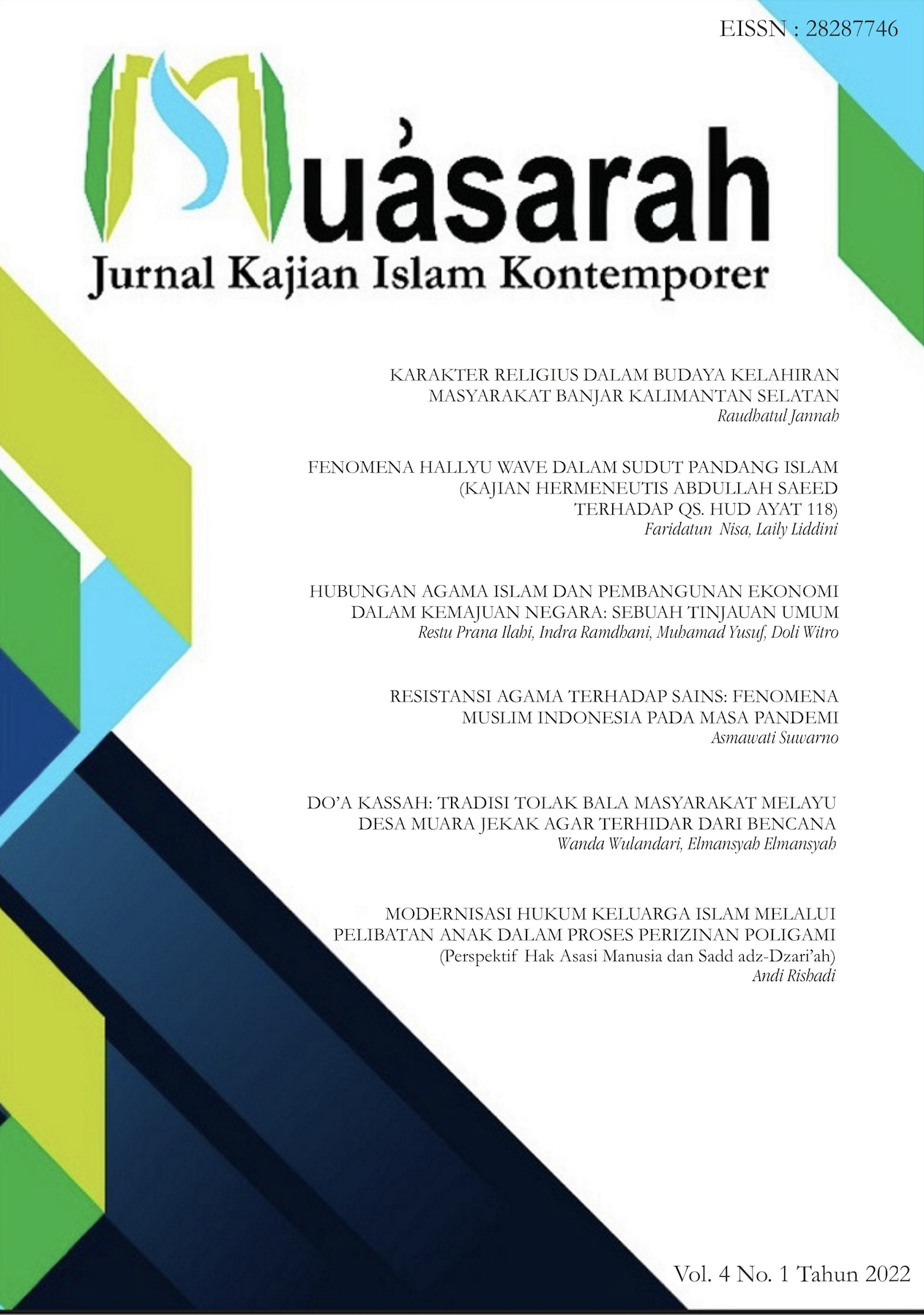FENOMENA HALLYU WAVE DALAM SUDUT PANDANG ISLAM (KAJIAN HERMENEUTIS ABDULLAH SAEED TERHADAP QS. HUD AYAT 118)
DOI:
https://doi.org/10.18592/msr.v4i1.6554Keywords:
Hallyu Wave, Hermrneutis, Abdullah SaeedAbstract
Abstract: Starting from the emergence of various contemporary phenomena, especially the hallyu wave phenomenon, this paper tries to explain the views of Qur'anic interpretation related to Korean culture which is currently widespread and even becomes public consumption. Textual Classical interpretations still lack in ability to answer current problems since it remain rely on the world of texts. Therefore, it needs a more contextual understanding. This effort is expected to be the initial step in looking at the next phenomenon which is more urgent to be understood in order to ensure that Islamic and national identity is maintained properly. The author uses Abdullah Saeed's Contextualist interpretation method to understand Qs. Hud: 118 as verses which sufficient to identify the current phenomenon then conform it into Islamic values. As a result, Islam is quite open in looking at foreign cultures, but must maintain and preserve its own culture. Thus a wasath attitude can be implemented, by not merely refusing outright and not accepting excessively the incoming culture.Keywords: Hallyu Wave, Hermeneutis, Abdullah Saeed Abstrak: Berawal dari kemunculan berbagai fenomena kontemporer, seperti fenomena hallyu wave, tulisan ini mencoba untuk menjelaskan terkait pandangan tafsir Qur’an terkait budaya Korea yang sedang maraknya tersebar bahkan hingga menjadi konsumsi publik. Tafsir klasik yang bersifat tekstualis secara umum masih belum bisa dikatakan menjawab problem kekinian karena masih bertumpu pada dunia teks sehingga perlu adanya pemahaman yang lebih kontekstual. Upaya ini diharapkan dapat menjadi pijakan awal dalam memandang fenomena selanjutnya yang lebih urgent untuk dipahami sehingga identitas keislaman dan kebangsaan tetap terjaga dengan baik. Penulis menggunakan metode tafsir Kontekstualis Abdullah Saeed untuk memahami Qs. Hud: 118 sebagai ayat yang cukup untuk mengidentifikasi fenomena saat ini agar sesuai dengan nilai Islam. Hasilnya, Islam cukup terbuka dalam memandang budaya luar, akan tetapi harus tetap mempertahankan dan melestarikan budaya sendiri sehingga sikap wasath dapat diambil, yaitu dengan tidak menolak secara mentah dan tidak menerima secara berlebihan terhadap budaya yang datang.Kata Kunci: Hallyu Wave, Hermeneutis, Abdullah SaeedReferences
Abu Daud. t.t. Sunan Abu Daud, Kitab Libas, Hadis No. 3512.
Anindia, Agis. 2022. “Diplomasi Budaya Korea Selatan Melalui Korean Cultural Center dalam Program Hanbok Experience.” Moestopo Journal of International Relations 2 (1).
Fina, Lien Iffah Naf’atu. 2015. “Interpretasi Kontekstual Abdullah Saeed: Sebuah Penyempurnaan terhadap Gagasan Tafsir Fazlur Rahman.” Hermeneutik 9 (1).
Garima Ganghariya dan Rubal Kanozia. 2020. “Proliferation of Hallyu Wave and Korean Popular Culture Across The World: A Systematic Literature Review From 2000-2019.” Journal of Content, Community & Communication 11 (6).
Jayana, Thoriq Aziz. 2019. “Model Interpretasi al-Qur’an dalam Pendekatan Tafsir Kontekstual Abdullah Saeed.” Al-Quds: Jurnal Studi al-Qur’an dan Hadits 3 (1).
Jin, L. S. 2011. “The Korean Wave: The Seoul of Asia.” The Elon Journal of Undergraduate Research in Communication 2 (13).
Kurniasih, Lutfia Dwi. 2021. “Did You Know: Hallyu, Fenomena Korean Wave yang Guncang Dunia.” Okezone. Desember 9. https://www.google.com/amp/s/edukasi.okezone.com/amp/2021/09/15/65/2471847/did-you-know-hallyu-fenomena-korean-wave-yang-guncang-dunia.
Kusnandi, Asep. 2019. “Nilai-nilai Keberagaman Pada Pancasila Perspetif al-Qur’an Surat al-Hujurat Ayat 13.” al-Qalam 7 (2).
Ma Young Sam, Song Jung-he & Dewey Moore. 2012. Korea’s Public Diplomacy: A New Initiative the Future. The Asean Institute for Policy Studies.
Nasititi, Salsabila. 2022. “Peran Brand Ambassador dan Hallyu Wave dalam Membentuk Keputusan Pembelian Nature Publik.” Universitas Bakrie.
Nurhaidah, M. Insya Musa. 2015. “Dampak Pengaruh Globalisasi Bagi Kehidupan Bangsa Indonesia.” Jurnal Pesona Dasar 3 (3).
Qurthubi. t.t. Vol. 11.
Rachmawan, Hatib. 2013. “Hermeneutika al-Qur’an Kontekstual: Metode Menafsirkan al-Qur’an Abdullah Saeed.” Afkaruna: Jurnal Ilmu-ilmu Keislaman 9 (2).
Razi, Fakhruddin ar-. 2000. Mafatih al-Ghaib. Vol. 17. Beirut: Dar al-Kutub al-Ilmiyah.
Robert Jackson dan Georg Sorensen. 2006. Introduction to International Relations: Theories and Aproaches. 3 ed. Oxford: OUP.
Saeed, Abdullah. 1999. “Rethinking ‘Revelation’ as a Precondition for Reinterpreting The Qur’an: A Qur’anic Perspective,.” Journal of Qur’anic Studies 1 (1).
———. 2006. Interpreting The Qur’an: Towards a Contemporary Approach. New York: Routledge.
Saifuddin, Zainal Arifin dan M Tohir. 2021. “Ayat Multikultural dalam al-Qur’an.” Al-Thiqah: Jurnal Ilmu Keislaman 4 (1).
Subulussalm. 1447. 4 ed.
Downloads
Published
How to Cite
Issue
Section
License
Authors who publish with this journal agree to the following terms:
- Authors retain copyright and grant the journal right of first publication with the work simultaneously licensed under a Creative Commons Attribution License that allows others to share the work with an acknowledgement of the work's authorship and initial publication in this journal.
- Authors are able to enter into separate, additional contractual arrangements for the non-exclusive distribution of the journal's published version of the work (e.g., post it to an institutional repository or publish it in a book), with an acknowledgement of its initial publication in this journal.
- Authors are permitted and encouraged to post their work online (e.g., in institutional repositories or on their website) prior to and during the submission process, as it can lead to productive exchanges, as well as earlier and greater citation of published work.






